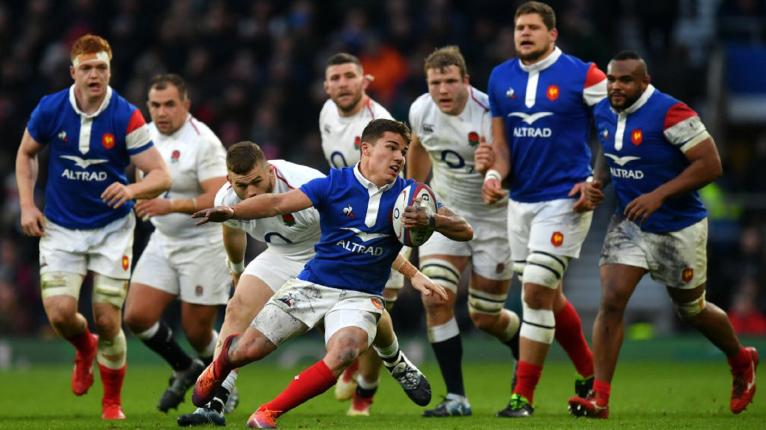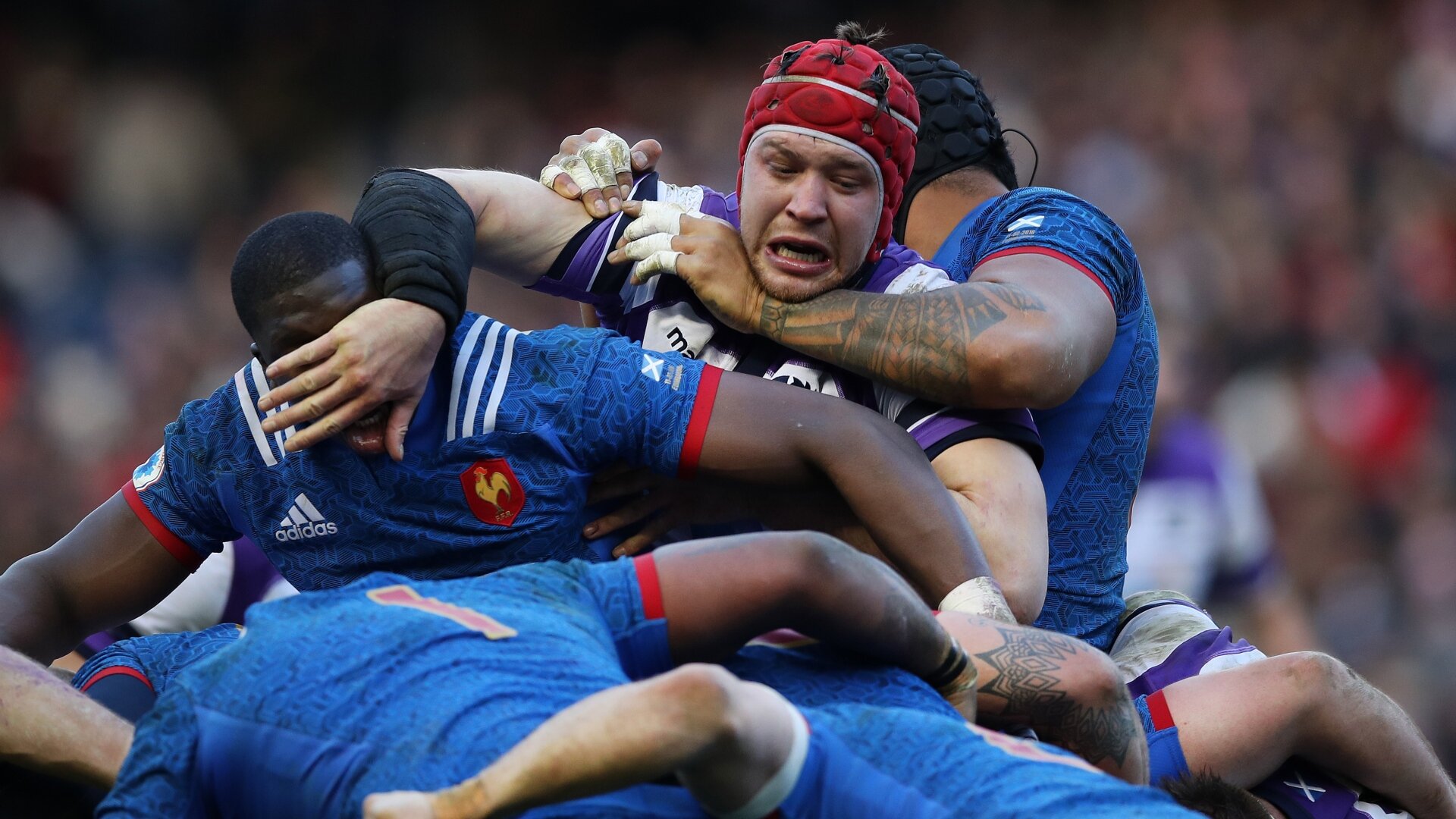Pre-match analysis: France vs Scotland

Recently, the pilloried French coach Jacques Brunel has given the impression of a child at the controls of a fighter jet – pushing any button and grabbing any lever in the hope it somehow takes off.
Against England, he played a centre on each wing and a wing at full-back while his form scrum-half, Antoine Dupont, sat on the bench and his starting nine, Morgan Parra, ambled around aimlessly. France played with the conviction of a newborn lamb and the cohesion of a giraffe on an ice rink. Their 44-8 shellacking was utterly deserved and deeply humiliating; such a grand rugby nation shamed by so fierce a foe.
In the aftermath, Parra and his half-back partner Camille Lopez did not conceal their feelings about the coaching.
“I think that we are capable of doing what the English do, but are we working on this during training? I think we don’t work on it enough, even not at all,” said Parra.
“We are the first to be at fault, us the players, since we are on the field. But I think it is not just us, and we are not alone in this disaster,” added Lopez.
The Clermont two were duly booted out of not just the starting XV but the entire match-day squad for the visit of Scotland. Brunel insists the omissions are strictly “a sporting choice”, but he’d have a job getting even Joey Tribbiani to swallow that one.
????????? Voici la composition de votre #XVdeFrance pour le 3e match du @SixNations_FR contre @Scotlandteam, samedi au @StadeFrance ! #FRAECO #NeFaisonsXV pic.twitter.com/SENrmsaHiL
— France Rugby (@FranceRugby) February 19, 2019
Equally damning was the testimony of Sebastian Vahamaahina after France capitulated at home to Wales, chucking a 16-0 half-time lead on the opening weekend.
“I did not even know I was captain. It was the referee, Wayne Barnes, who came to see me on a penalty to ask me my choice,” the lock said.
“I told him to address the captain; he said it was me. The staff did not warn me.”
There is talk of a revolt against Brunel and evidence to back it up. The famous French newspaper Midi-Olympique has reported that FFR president Bernard Laporte read the squad the riot act this week and ran quotes from an unnamed player saying “nobody knew which position to play” in the second half at Twickenham.
“It was chaos. We were lost on the pitch and tried to ask the bench,” he went on.
These aren’t poor rugby players we’re talking about. Gael Fickou and Yoann Huget have scored a combined total of 15 tries for their clubs this season but Brunel is playing them out of position. World-class athletes look tentative, jaded and forlorn. In football parlance, it seems Brunel has “lost the dressing room” and whatever bond he had with his team has decayed.
Again, he has revved up his selection tombola but whether by design or by luck, he has thrown together a much more encouraging and progressive backline this week. For starters, Huget and Fickou are shifted to their preferred (and best) positions of wing and centre respectively. At this point, France are as well exposing their burgeoning talents to Test rugby and Thomas Ramos, the electric Toulouse full-back, gets his first start aged 23. Dupont, a year younger, finally wears the number nine jersey. Nineteen-year-old Romain Ntamack made his debut at centre against Wales and was benched against England – he is a gamble at fly-half, but an exciting one in what, according to statistics supremo Simon Gleave, is the ninth starting half-back pairing fielded by France in the championship since the last World Cup. These blokes are well good enough to forge an immense future in Test rugby – whether the madcap selection policy allows them time to flourish is another matter.

Damian Penaud is still a fish out of water in the 14 jersey and you fancy Scotland will try to expose his flaws as ruthlessly as Jonny May and England did a fortnight ago. But France still have a monster pack with enough beef to stick it up the jumper and bludgeon their way forward if, as may well be the case, they start to run out of ideas.
Les Bleus are in a hideous state. They have lost ten of the 13 Tests on Brunel’s watch. This is Scotland’s best chance to win in Paris since that incredible day in 1999, but still, you don’t feel too bullish about their prospects of actually making it happen.
Continue reading below…
Watch: Scotland Assistant Coach Mike Blair on France clash
Take Italy out of the picture, and Scotland last won an away Six Nations match nine years ago.
They began the championship with an injury list of 20. Some of those – most notably Zander Fagerson, Magnus Bradbury, George Turner and Fraser Brown – have returned to fitness but more of their biggest beasts have fallen.
Their first-choice back-row from last year – captain John Barclay, Hamish Watson and Ryan Wilson – are all out. Sam Skinner is crocked and so is WP Nel. Huw Jones’ championship is over. Stuart Hogg is battling to get himself back from a shoulder problem in time to play England in the final game and Finn Russell has not recovered from a concussion suffered on club duty. That’s eight near-certain starters – effectively half a team – unavailable to Gregor Townsend and a barrage of their rivals already on the treatment table. It is a brutal position and an epic test of Scotland’s resources.
Ready for Round 3? of the Guinness Six Nations! @Scotlandteam get familiar with their surrounding in the Stade de France during team run this morning. #AsOne pic.twitter.com/DlJv4OqgsS
— Scottish Rugby (@Scotlandteam) February 22, 2019
Most grievous of all is the loss of Russell, who sustained the head injury playing for Racing 92 on Sunday. This is a troubling scenario for Scotland. Russell knows the mountain of Euros he pockets comes at a physical price – Racing want their handsomely-paid superstar on the field. But when player welfare is, apparently, everyone’s number-one priority, pitching him into a Top 14 match after back-to-back Tests, six days before his next international, hardly seems humanitarian. Greig Laidlaw played 80 minutes for Clermont last weekend too and mercifully for Scotland emerged intact.
Continue reading below…
Watch: Scotland captain Greig Laidlaw ahead of Saturday’s Six Nations Test with France.
Townsend has fine alternatives to most of his sidelined contingent – Blair Kinghorn for Hogg, Nick Grigg for Jones, Bradbury for Wilson – but he doesn’t have another 10 of Russell’s brilliance just now. Pete Horne, who gets the nod, is a clever and underrated deputy, but he is better deployed at inside centre and not in Russell’s class as a play-maker. He hasn’t played a Test at fly-half since November 2017 and has started only two of his 39 caps in the pivot position. Adam Hastings is the long-term rival to Russell but he is still very raw and his Glasgow form of late has been decidedly flaky. Chucking him into the fray in front of 80,000 would have been an exceedingly bold call. As BBC analyst Colin Gregor put it, Townsend must find a way of replacing the irreplaceable.
France may be a basket-case, but Scotland have their challenges too. They have a riveting squad with talents everywhere and if they are ever going to realise their potential – if they are ever going to amount to anything – these are the matches they have to nail. Even with that injury list, even without Russell, Townsend fields a strong line-up. If they can’t win in Paris now, when will they?







































































